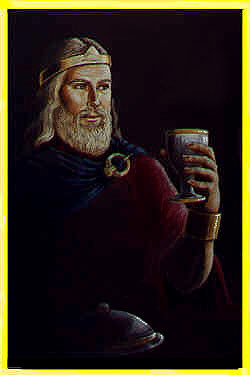
In Dindshenchas; A Magical Mystery Tour, we discussed the poem on Carmun as an example of dindshenchas celebrating a particular geographical place. It describes a major óenach which takes place every three years, and the activities of that fair, as well as the origin-tale of the character Carmun said to be buried there. We discussed óenachs before in the context of The Story of Macha. Here is a link to the article, “Beidh Óenach Amárach”, which discusses the nature and importance of fairs in early Irish society, using this poem: https://storyarchaeology.com/2012/07/05/beidh-aenach-amarach/ Below are the stanzas which we referred to in Dindshenchas; A Magical Mystery Tour. You can read Gwynn’s full translation of all 81 stanzas here.
Carmun
Metrical Dindshenchas, Vol. 3
poem 1, pp 2 – 25
Description of the place
Stanza 2:
Carmun céte óenaig fhéil, Carmun, venue of a hospitable fair, co faithchi róenaig roréid, With level greens and tracks; in t-shluaig tictís dia thaichmi, Commemorated by the hosts that came arfigtís a glan-graifni. To contend in its pure horse-races.
Stanza 3:
Is railecc ríg a rúam rán, A cemetery of kings is its noble gathering place, cid sain-sherc slúag co sóer-grád; Especially valued by its high status hosts; fail mór fo dumaib dála Here where a great assembly is camped dia shlóg bunaid bith-gráda. In honour of the event’s foundation.
Description of the person and her death
Stanza 11:
Cairmen as cach bricht co mblaid Carmun, by means of every spell of fame, aidcgled cach mhblicht mborr-thoraid, Dried up the sap of swelling fruit, iar ngleicc as cach dán nar dlecht, She caused strife with her forbidden arts, na meicc tria ág tria anrecht. Her sons through battle and lawlessness.
Stanza 19:
Tancas sund tria gáine ngnó, They came, (the Táath Dé), for the sake of her beauty, dia cáine dia cét-gubo, To keen and raise the first laments (la Túaith Dé) dar sóer-mag sair, Over her, on this gentle plain; cétna óenach cóir Carmain. This was the first true fair of Carmun.
Description of the fair
Stanza 53:
Hi Kalaind Auguist cen ail On the first of August, without argument, tiagtís ind cech tress blíadain; Every third year they would gather together; agtís secht ngraifne im gním nglé They would hold seven races, for a glorious prize, secht laithe na sechtmaine. One for every day of the week.
Stanza 54:
And luaitís fri bága bil There they would undertake verbal battles, certa ocus cána in cóicid, Hotly debate the rights and taxes of the province, cech recht ríagla co rogor Every legal enactment cech tress blíadna a chórogod. Re-ordered every third year.
Privileges of the fair
Stanza 55:
Ith, blicht, síth, sáma sona, Corn, milk, peace, happy ease, lína lána, lerthola, full nets, ocean’s plenty, fir ríglaich, co combáid cind royal laymen, in alliance with chiefs, dirmaig forráin for hÉrind. many troops victorious over Ireland.
Prohibitions of the fair
Stanza 56:
Acra, tobuch frithir fíach, Suing, harsh levying of debts, écnach, écraite, anríad, satirising, quarrelling, misconduct, ní lamar la graifne in gáid are not dared during the requisite races élúd aithne, athgabáil. absconding with a deposit, nor distraint.
Stanza 57:
Cen dul fher i n-airecht mban No men to go into an assembly of women, cen mná i n-airecht fer findglan no women into an assembly of fair, pure men; mad aithed and, nír’ chlunter, as for elopement, it is not to be thought of, cid athfher cid athmunter. neither a second husband nor a second family.
Penalties
Stanza 58:
Cipó tí dar recht na ríg, Whoever transgresses the law of the kings Benén co becht rabúan-scríb, Benén prescribed firmly for ever ná beth ar ás ‘na fhine that he should not thrive in his tribe, acht a bás ‘n-a bith-bine. but should die for his mortal sin.
Customs at the fair (including lists of poets’ recitations)
Stanza 59:
Is iat a ada olla These are the [óenach’s] great customs: stuic, cruitti, cuirn chróes-tholla, trumpets, harps [recte “lyres”], hollow-throated horns, cúisig, timpaig cen tríamna, pipers, tireless timpanists, filid, ocus fáen-chlíara. poets and gentle musicians.
Stanza 60:
Fian-shruth Find, fáth cen dochta, The inexhaustible stories of Find [McUmaill], togla, tána, tochmorca, destructions, cattle-raids, wooings, slisnige, is dúle feda, riddles [lit. “obliques”? / “splinters”?], and lists of [Ogam] letters, áera, rúne romera. satires, keen mysteries:
Stanza 61:
Ároisc roscada ríagail, The proverbial “rosc”-verses of law, ‘s tecusca fíra Fithail, and truthful teachings of Fithal, dubláidi dindshenchais [dait], dark poems of the Dindshenchas tecusca Cairpri is Chormaic. teachings of Cairpre and Cormac:
Stanza 63:
Scél tellaig Temra, nach timm, The tale of the household of Tara, fis cech trichat in hÉrind, the knowledge of every county in Ireland, banshenchas, buidne, bága, the history of women, tales of armies, battles, bruidne, gessi, gabála. hostels, magical prohibitions, invasions.
Stanza 67:
Aitte, oirgne, aidbse cheóil, Death-tales, slaughters, chanting of music; coimgne cinte cóem-cheneóil, exact history of good peoples; a réim ríg, rath dar Bregmag, his royal succession, bestowed by Bregmag a chath is a chrúad-engnam. his battle and his harsh valour.
Consequences of neglect
Stanza 79:
Fil ara nemdénam de There comes for neglect of it máile is meth is moch-léithe, baldness, weakness, early greyness, ríg cen géri, cen grinni, kings without keenness or jollity, cen fhéli cen fhírinni. without hospitality or truth.
